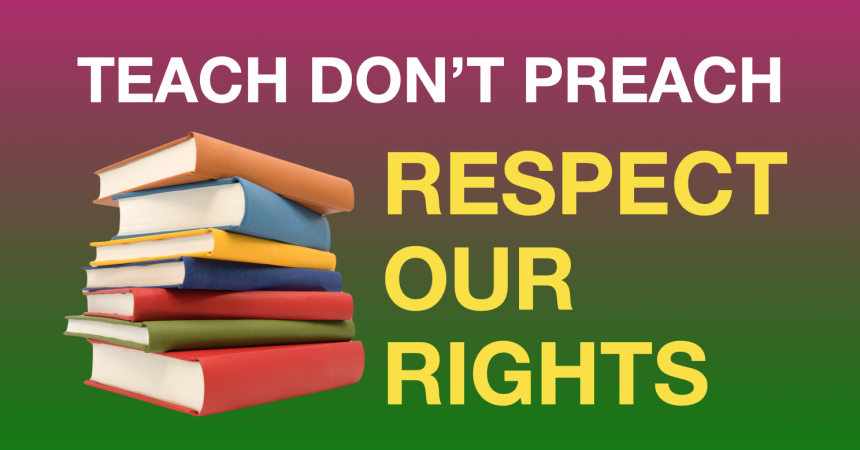
NCCA to consider new Court of Appeal judgment when reviewing Primary Curriculum
Last November Atheist Ireland made a submission to the NCCA’s consultation on the Primary Curriculum. The consultation date is now over. But the NCCA has agreed to consider a new Appeal Court judgment as part of its review, after Atheist Ireland sent them the following letter:
Atheist Ireland letter
We are contacting you with regard to the Consultation on the Draft Primary Curriculum Framework. We appreciate that the current phase with regard to submissions is complete.
A recent case at the Court of Appeal has implications for the Draft Primary Curriculum Framework. We believe that you should take this into consideration, as the 1999 Framework Curriculum undermined the rights of non religious minorities in the education system.
The case at the Court of Appeal was in relation to home schooling and the Leaving Certificate scheme in 2020. However the Court of Appeal set out the Constitutional rights of parents and their children in the education system. It is clear to us from this case that our Constitutional rights have been ignored by the NCCA for years.
The Court of Appeal in the Burke v Minister for Education case stated that:
“The respondents possessed constitutional rights to have reasonable account taken of their situation when education policies were being implemented by the State.” (page 124)
190 “We consider that the structure of the Constitution, including the fact that Article 41 relating to the family is immediately followed by Article 42 relating to education, together with the express wording of those Articles, place the family at the heart of the provision of education. Parental duty to provide for education is paramount and parental choice in how that is provided is guaranteed. Furthermore, the right to education and the right of a child to realise his or her full potential, has been recognised as part of the natural rights guaranteed by Article 40.3. The State, pursuant to Article 41.1.2, also guarantees to protect the family in its constitution and authority.”
191 “This Court considers that the case law demonstrates that the relationship between parents, the State and the child as envisaged by Article 40, 41, and 42, is a trifecta not just of the participants but of the rules under which constitutional engagement on education must take place; namely right, duties and powers. It is only through understanding the interwoven nature of those relationships, that clarity can be brought to the complex constitutional provisions on education…”
The philosophy behind the 1999 Framework Curriculum is that curriculum areas are integrated into each other, and that includes religion. It is clear from the 1999 Framework curriculum that the NCCA took no account of the Constitutional rights of non religious parents and their children, and the impact that the religious integrated curriculum will have on their rights.
One key point from the Burke case that it is not up to the NCCA or the Department of Education to decide what type of religious or moral education is or is not suitable for parents and their children. It is for parents to decide this given the structure, wording and values in the education provisions of the Constitution which indicate a particular philosophy. The NCCA continues to decide what it believes is suitable or not suitable for students in relation to religious and moral education. You simply have no right to do this.
The Court of Appeal also stated that the decision of the Supreme Court in the Campaign to Separate Church and State v Minister for education is binding authority (para 171). The Supreme Court in the Campaign case (1998) said that Article 44.2.4 of the Constitution must be read in conjunction with Article 42 which contemplates children receiving religious or moral education but in accordance with the wishes of parents. This means that students have the right to not attend any religious or moral teaching that is not in accordance with the conscience of their parents.
Also, as the Burke Case judgment makes clear, they should not be disadvantaged by their parents’ choice where it is reasonably possible to avoid that outcome.
We ask that in considering the new Framework curriculum that you take into account the Constitutional rights of non religious parents under Article 40, Article 41, Article 42, and Article 44.2.4 of the Constitution.
NCCA reply
On behalf of the National Council for Curriculum and Assessment (NCCA), I would like to thank Atheist Ireland for its interest in and contribution to the consultation on the Draft Primary Curriculum Framework.
This important consultation will inform the purpose, structure and content of the future primary school curriculum. We therefore appreciate the time of individuals and organisations in sharing their feedback with us.
The correspondence that you attached in your email on March 30 for Arlene Forster’s attention concerning a recent Appeal Court decision on the Constitutional rights of parents and children will be included as part of the submissions to the consultation.







0 Comments
No comments!
There are no comments yet, but you can be first to comment this article.